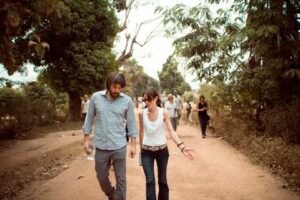
This is the third part of a series by Abraham Leno, our executive director, called “How to Survive a Disaster.”
Read the rest:
- Lessons from eastern Congo
- Disaster is a part of life, and you are not alone
- Survival builds expertise
- In a crisis, you learn what business you’re in
- Be powerful when you can
- Humanity matters more than anything
- You can still have joy
To most in the developed world, a health emergency — the kind that overwhelms health systems, destroys national economies, and fills mass graves — has never happened in their lifetime. It is truly unprecedented. But in the Democratic Republic of Congo (DRC), people have endured not one but two Ebola outbreaks just since 2017 — one of which is still going on today in North Kivu province, which has also emerged as a regional hub of COVID-19 disease.
It is a profound misfortune, to be sure. But misfortune survived turns into expertise.
When ECI began ten years ago, our founders, Ben Affleck and Whitney Williams, decided to invest in exactly that kind of expertise. Rather than parachuting into eastern Congo to set up well-meaning “programs,” the way most international humanitarian organizations do, Ben and Whitney realized that Congolese people were already solving the challenges they faced — with greater skill, wisdom and ingenuity than foreigners ever could. They invested in local organizations, like Dr. Denis Mukwege’s Panzi Hospital, that were doing the most transformative work in their communities.
Hard-earned expertise is especially important in moments of crisis like this one. Many people in Congo don’t have clean water, but those who do wash their hands as often as they can — with soap or, where there is no soap, with ashes. Congolese doctors and nurses have little equipment, but they know how to counsel frightened people about infection control. Congolese civil servants may not have the CDC to turn to, but they know how to mobilize an epidemiological surveillance program quickly. Long before the United States had formulated a response to the coronavirus, our little clinics had already put in orders for extra disinfecting materials and protective equipment.
Too often, residents of prosperous nations think of people in the developing world as victims to be pitied. In this moment of global crisis, we can see their expertise for the priceless resource it is.
Next time: How disaster can force us to clarify our mission.
Photo: Ben Affleck and Whitney Williams in Congo at the beginning of ECI.
